Exploring the Benefits of Efficient Calendar Meeting Management
Introduction
In today’s fast-paced work environment, staying organized and maintaining clear communication are more crucial than ever. Efficient calendar management can be a game-changer for teams, enhancing productivity, collaboration, and overall workplace harmony. Imagine a world where scheduling conflicts are minimized, meetings run smoothly, and everyone knows exactly what to expect.
This isn’t just a dream—it’s an achievable reality with the right tools and practices. Recent surveys have shown a significant increase in meetings due to remote work, making effective scheduling paramount. From leveraging tools like Notion Calendar to implementing best practices in time management, this article delves into how smart calendar management can transform team dynamics and drive success.
Let’s explore how to keep your team on track, reduce stress, and ensure that every minute counts.
Benefits of Efficient Calendar Management
Efficient calendar management can revolutionize team operations by fostering productivity and collaboration. By utilizing a well-structured gathering and scheduling system, organizations can reduce conflicts, enhance logistics, and enable employees to focus on their primary tasks. According to a survey by Acuity Training, 61% of workers reported an increase in meetings due to remote work, making effective scheduling crucial. Implementing solutions like Notion Calendar, which bridges the gap between personal and work plans, ensures that deadlines are met and overbooking is avoided. Historical trends show that while machine learning has gained public attention, combinatorial optimization remains vital for logistics, resource allocation, and project scheduling. For instance, Twinkl’s utilization of Toggl Track has greatly enhanced their scheduling, resulting in more satisfied and efficient teams. A well-organized schedule serves as a roadmap, directing groups towards their goals and turning unexpected scheduling issues into history.
Boosting Productivity
Effective calendar organization enables workers to concentrate more on their primary duties instead of being hindered by scheduling issues or avoidable gatherings. When schedules are well-organized, teams can dedicate uninterrupted sessions to their projects, which significantly boosts productivity. ‘According to Acuity Training, 50% of individuals who utilize the Eisenhower Matrix for managing their tasks feel that their work is under control daily.’. Furthermore, a study by WorkFront emphasizes that 58% of American workers are so occupied with daily tasks that they lack the opportunity for strategic thinking. By optimizing scheduling systems, organizations can ensure that their employees are not just busy but genuinely productive, leading to faster project completions and improved outcomes.

Enhancing Clear Communication
An effective scheduling system guarantees that all team members are aligned concerning appointment schedules, agendas, and duties. This clarity significantly reduces misunderstandings and guarantees that everyone knows what to expect, fostering a more cohesive working environment. When everyone is in agreement, it results in more effective decision-making during discussions. For example, a Latin American bank struggled with unclear expectations and responsibilities among team members, which led to frustration and inefficiency. By implementing a structured but flexible operating system, they were able to define roles and streamline communication, ultimately improving productivity. ‘This approach honors the time and attention of everyone engaged and permits reflective replies and well-thought-out concepts, ensuring that discussions are both fruitful and significant.’.
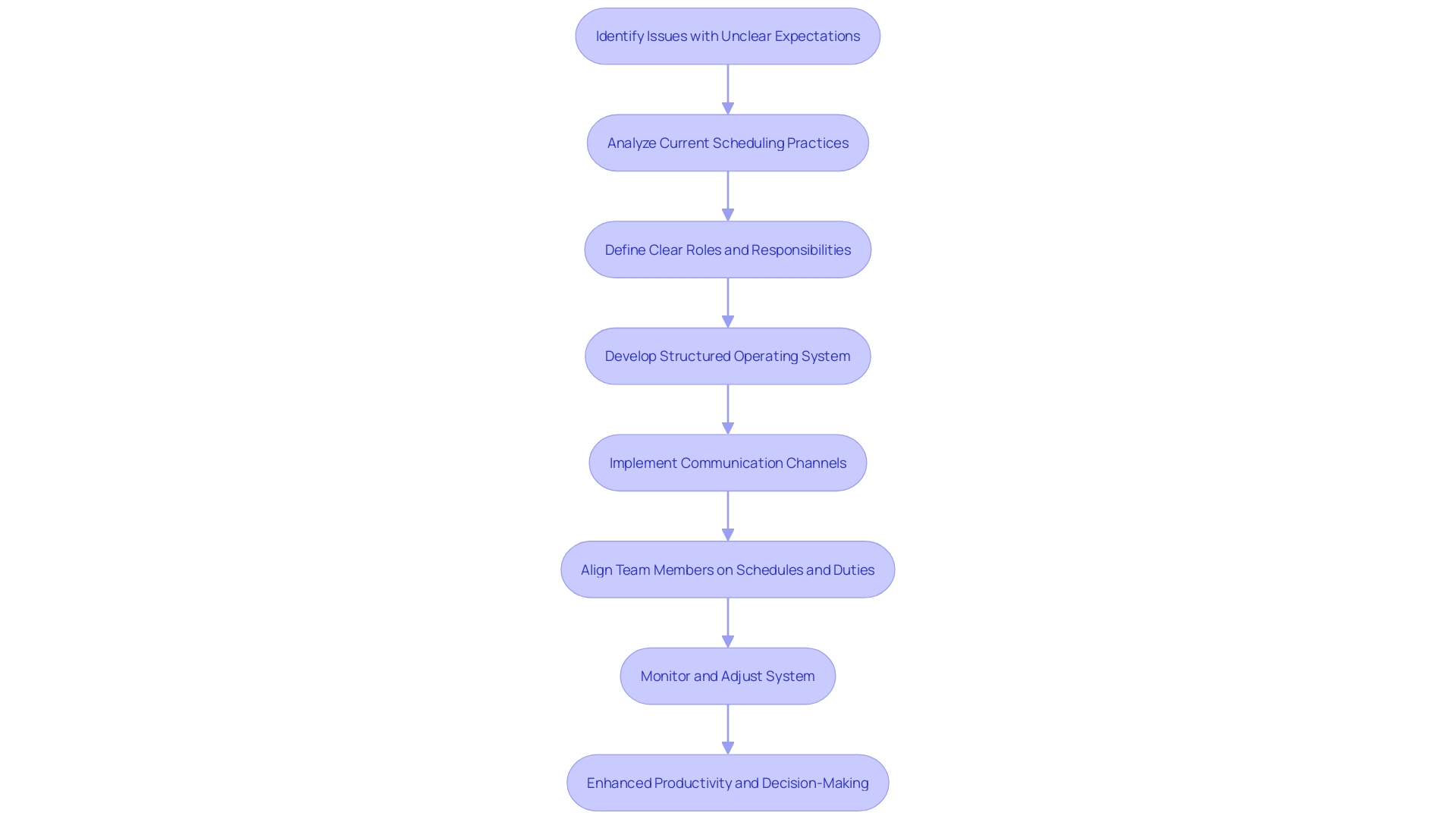
Best Practices for Efficient Calendar Management
To maximize the benefits of scheduling management, adopting a few key best practices can make a significant difference. Start by setting precise meeting schedules to prevent overlap and conflicts, ensuring a smoother workflow. Using joint calendars provides everyone insight into one another’s availability, promoting improved coordination and minimizing the duration spent on back-and-forth communications. Embracing technological tools for automation can further streamline this process, freeing up valuable time for teams to focus on more strategic tasks.
Time organization statistics reveal that 58% of American workers feel they are so swamped with daily tasks that they can’t think beyond their immediate to-do list. With efficient schedule management, you can alleviate such pressures. The Eisenhower Matrix, for instance, has proven to be highly effective, with 50% of users feeling in control of their work daily. This approach assists in prioritizing tasks according to urgency and significance, facilitating the arrangement of crucial gatherings and activities.
In the evolving landscape of hybrid work, where half the employees are remote and the other half in the office, the challenge lies in adapting collaboration for both in-person and remote workers. As Karin M. Reed and Joseph R. Allen, Ph.D., observe, the business realm is “reconsidering gatherings.” Utilizing automation tools and shared schedules can facilitate this change, ensuring smooth coordination and more effective sessions.
Meeting overload continues to be a significant issue, with 68% of people reporting a lack of uninterrupted focus time during the workday. By addressing this through improved calendar management and automation, companies can reduce fatigue from gatherings and enhance overall productivity. This not only streamlines processes but also ensures that everyone is on the same page, ultimately driving operational excellence.
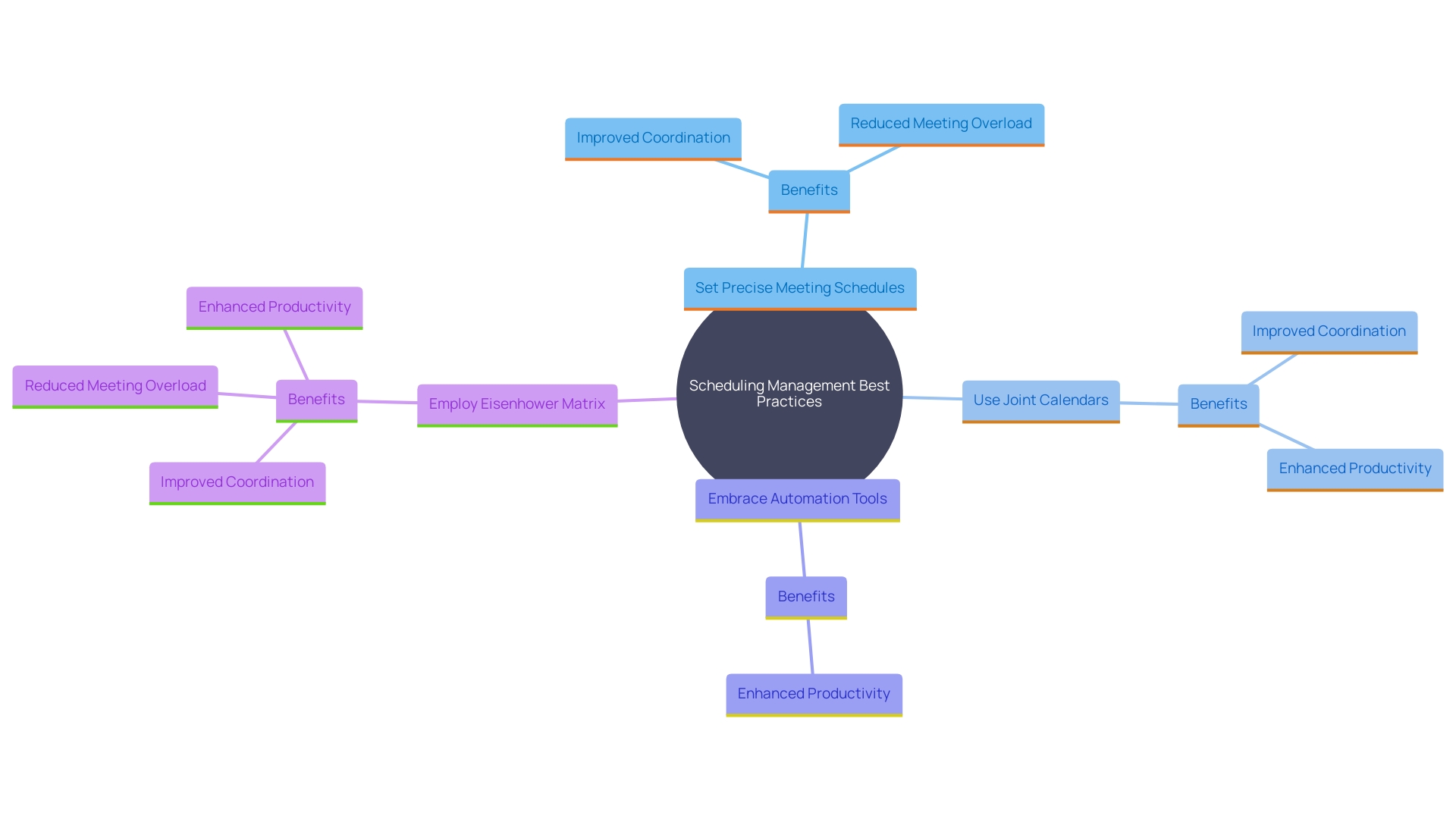
Regular Review and Evaluation of Meeting Progress
Consistently evaluating how gatherings are conducted is essential for ongoing enhancement. Collecting feedback from participants sheds light on both the strengths and weaknesses of current practices. This evaluation process is similar to the approach taken by various organizations that use Fact Sheets to communicate essential information effectively. These documents, employed by entities like the Centers for Medicare & Medicaid Services (CMS) and the Centers for Disease Control and Prevention (CDC), are designed to present key information in a clear and concise manner, ensuring that the message is easily understood by the target audience.
Integrating participant feedback into evaluations can change how gatherings are viewed and carried out. For instance, Adobe’s shift from annual performance reviews to real-time feedback has shown that continuous assessment can enhance organizational culture and effectiveness. The same principle applies to gatherings; by consistently seeking and responding to feedback, each session can be improved to have a clear purpose and provide value to all participants.
Furthermore, recognizing the influence of gatherings on employees is backed by significant statistics. A survey by Harvard Business Review indicated that remote work has increased the average number of gatherings by 13.5%, with 61% of remote workers participating in more discussions due to the pandemic. Furthermore, it’s reported that 83% of employees spend up to one-third of their workweek in discussions. These figures emphasize the significance of making each gathering efficient and purposeful.
Assessing the effectiveness of gatherings is not solely focused on pinpointing what’s failing but also on acknowledging and strengthening successful methods. This continuous cycle of feedback and refinement ensures that meetings remain productive and meaningful, ultimately contributing to the overall success of the organization.
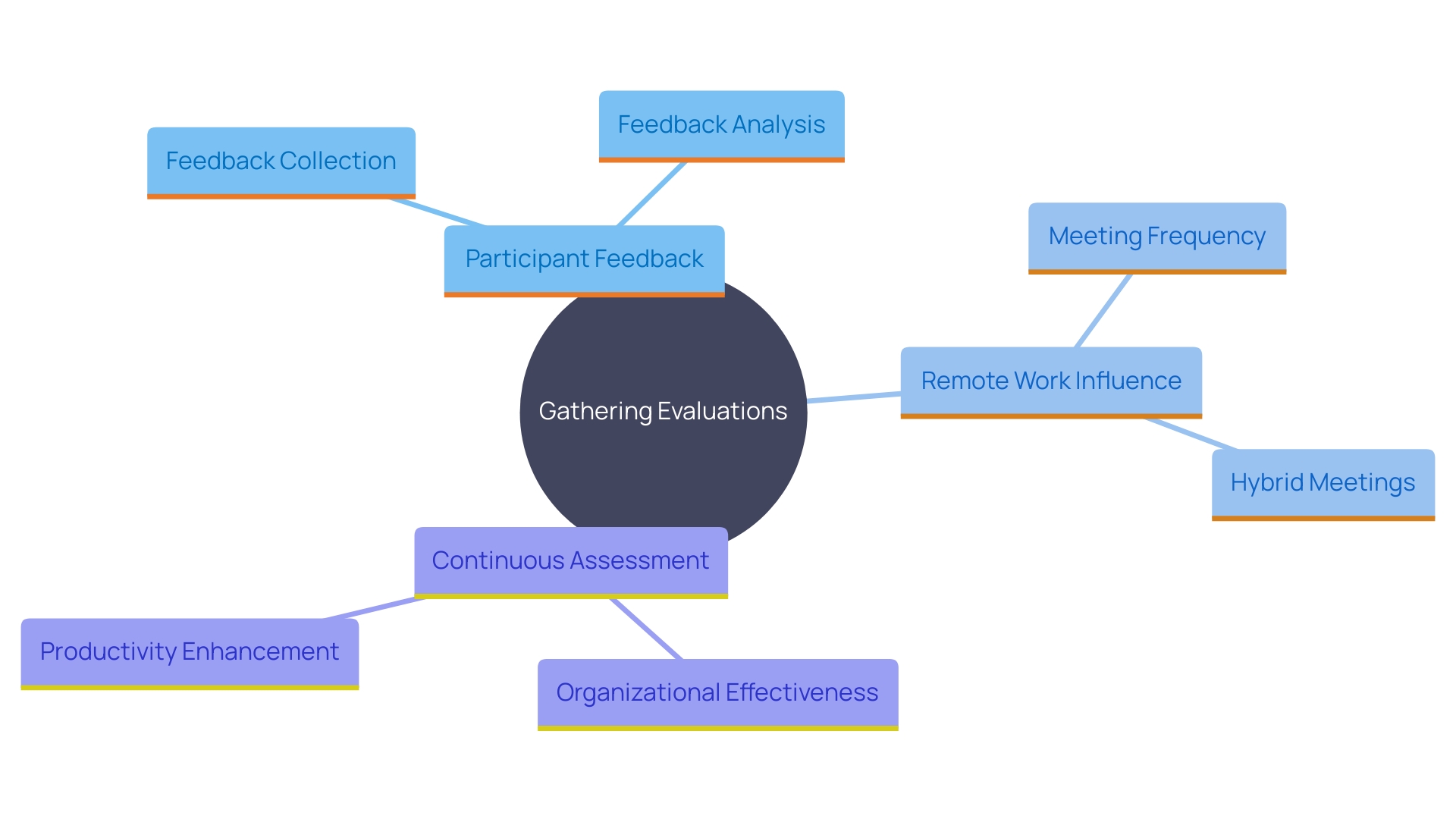
Conclusion
Efficient calendar management emerges as a crucial pillar for enhancing team dynamics and driving productivity in today’s work environment. By minimizing scheduling conflicts and ensuring clear communication, organizations can create a culture where employees focus on their core tasks rather than getting entangled in logistical issues. Tools like Notion Calendar and practices such as the Eisenhower Matrix not only streamline workflows but also empower teams to be genuinely productive, leading to faster project completions.
Moreover, the importance of clear communication cannot be overstated. An organized calendar system aligns team members on meeting agendas and responsibilities, reducing misunderstandings and fostering a cohesive work atmosphere. This clarity enhances decision-making and ensures that meetings are meaningful and productive.
Regularly evaluating the effectiveness of meetings further contributes to continuous improvement, making sure that each gathering serves a purpose and adds value to the organization.
Implementing best practices in calendar management, including shared calendars and automation tools, can significantly alleviate the pressures of a busy work environment. By embracing these strategies, organizations can not only reduce meeting overload but also enhance overall productivity. In a world where hybrid work is becoming the norm, prioritizing effective calendar management is essential for achieving operational excellence and fostering a thriving workplace culture.
Streamline your scheduling process today! Download our intuitive extension to enhance your calendar management and improve team productivity.
